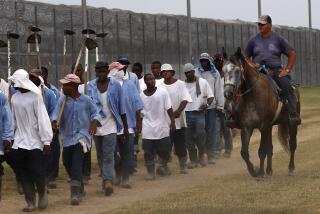The loose rules of detention
This month, the Department of Homeland Security opened the Karnes County Civil Detention Center in Texas -- a state-of-the-art facility intended to symbolize the Obama administration’s effort to reform a deeply troubled immigration jails system. The center, which houses only detainees with no serious criminal backgrounds, has no barbed-wire fencing. Immigrants are free to roam the facility. Those who choose to can do their own laundry.
The administration deserves praise for acting on its promise to treat immigrants as civil defendants awaiting their day in immigration court rather than as criminals serving time. Unfortunately, it hasn’t moved as effectively to change the rules governing how detention centers are run. Instead, Homeland Security officials have enacted weak guidelines that look good on paper yet are rarely or inconsistently enforced.
Consider that last month the administration rolled out new standards intended to curb abuses committed by detention center staff and detainees. Among other things, the new rules improve access to mental health care and legal assistance, and establish additional safeguards for reporting mistreatment. Yet the Karnes facility, which opened after the new standards were announced, is not required to comply with them because federal officials didn’t bother to write it into the operating contract. Instead, the facility will operate under 2008 guidelines, with an option to shift to the new rules later this year. Similarly, dozens of detention centers around the country operate under antiquated, less protective rules dating back as far as 2000.
The Obama administration isn’t entirely to blame. Anti-immigrant hard-liners have opposed even minor attempts to improve the detention system. Rep. Lamar Smith, the Texas Republican who chairs the House Judiciary Committee, has criticized the new standards as a “hospitality guideline for illegal immigrants.” Such rhetoric is irresponsible and ignores the fact that since 2003, more than 110 immigrants have died in federal custody. Smith opposes expanding the complaint system, for example, saying it provides too many options for detainees and no protections for federal agents who may be falsely accused. And he objects to providing female detainees access to abortions in cases of rape or if the woman’s life is in danger, even though federal prisons provide nearly identical access.
The government detains about 33,000 legal and undocumented immigrants on any given day in a sprawling network of 250 jails and privately run facilities. If the Obama administration is to continue to hold so many people, it has an obligation to ensure that they are treated fairly and humanely.
More to Read
Sign up for Essential California
The most important California stories and recommendations in your inbox every morning.
You may occasionally receive promotional content from the Los Angeles Times.










